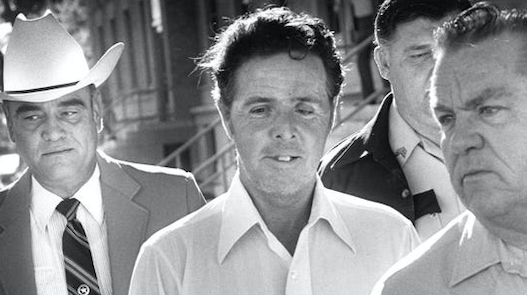
On October 31, 1979, a driver headed north on I-35 near Georgetown, Texas and noticed a body laying in between the highway and the nearby access road. Upon discovering the body, the driver drove to the nearest gas station where he called the Williamson County Sheriff’s Department. When the officials arrived, the body was discovered to be a young nude female, with the only item of clothing and physical evidence being a pair of orange socks. These orange socks would be the only identifier for the young female throughout her investigation.1
Henry Lee Lucas, a man neglected and abused by his mother at a young age, began his life of crime early on in his life. There wasn’t anything he had been charged and arrested for in the past that would amount to the vile acts he would confess to in future years, including confessing to the murder of the Orange Socks girl.2

Leading up to his confession, Lucas had been arrested for the possession of a firearm by a felon and taken to the Montague County Jail. While in custody, Lucas decided he would hand in a previously written statement that entailed the confessions to several murders.3 Within two days of his arrest in Montague County, he began confessing to slews of killings from all over the country. These confessions would, many years later, get him ultimately convicted of ten homicides, and he would be a very strong suspect in over one hundred other homicides.4 Lucas said that there were sixty murders he had added to his confession as a means to get back at the police for arresting him on the firearm charge, which he thought to be a charge made-up by the police. Although Lucas had confessed to many killings, it was his June 1983 confession to the Orange Socks murder that would get him convicted and lead him to become involved in the 1989 court case Lucas v. State of Texas.5
In 1989, the Lucas v State trial commenced, in which Lucas was tried for the murder and rape of the unidentified female in Williamson county, better known as the “orange socks girl.” During the court’s proceedings, psychiatrists, state witnesses, as well as Lucas were put on the stand to testify and be questioned. As the trial came to a close, the defense brought in an expert psychologist and psychiatrist to give their testimony regarding the evaluations they had previously conducted on Lucas. The expert psychologist Dr. Tom Kubiszyn conducted his psychological evaluations on February 28 and 29 of 1984, lasting about seven hours each, and from these evaluations Kubiszyn testified that Lucas, “has an IQ in the low average or normal range, with strong feelings of inadequacy and inferiority, of evasiveness and suspiciousness.”6 Kubiszyn also diagnosed Lucas as being schizophrenic while having some qualities of a sociopathic disorder. The expert psychiatrist Dr. Jay Fogelman had conducted five interviews with Lucas where he gained information from Lucas about himself. From these interviews Fogelman came to the same conclusion as Kubiszyn in that Lucas was suffering from some form of schizophrenia that needed treatment, as well as that he may have an antisocial personality. Both Kubiszyn and Fogelman said that Lucas was not only suffering from the previously mentioned schizophrenia, but that he was also a dangerous individual based on his history of previous violence.7
When the issue of his right to an attorney arose for Lucas, he tried to claim that he was denied his right to counsel guaranteed to him in the sixth amendment. But it was also noted that he did not go against the statements given by the state witnesses and understood that he would not receive counsel and did not want an attorney present. Later, against the advice of his various attorneys to remain silent and implement discretion, Lucas chose to do the opposite and he had appeared “…to have been determined to speak to the authorities desiring his attention. In what may be best termed a single-minded purpose, he appears to have rejected his right to remain silent and put the State to its burden of proving a particular crime…..appellant made what can only be termed a conscious practice of informing on himself as to crimes which, up until that point in time, remained unsolved.” In this same scenario, Lucas claimed he only wanted to talk about where the bodies were, as long as someone listened and was determined to only confess to his “criminal conduct” based on his desires and terms.8

As the trial continued, Lucas described the incident in his words. Lucas described the Jane Doe has having refused to engage in intercourse with him and of having tried to jump out of the moving vehicle. Lucas claimed she grabbed hold of the steering wheel, and that he grabbed her in a motion to try and stop her attempt to escape, while she fought against him. This action caused by the deceased was thought to Lucas as a sufficient reason to handle her in such a manner since it could’ve resulted in a car accident and in his own demise. The court did not find this evidence and information useful in the incident that the deceased was trying to provoke violence from Lucas or to incite him. Despite this information and the details coming solely from Lucas, who would’ve been present for the crime, the court did not find any information that corroborated that Lucas had any desire or intention to release Jane Doe alive. Based on this notion, it was derived that Lucas killed the deceased not based on the passion in the heat of the moment, but from careful calculation.9
Based on all the relevant information and testimony given by the state’s witnesses, expert psychiatrist and psychologists, as well as Lucas’ own testimony, the court reached a verdict in the Lucas v. State trial. The verdict reached was guilty on the capital murder charge on Lucas, and he was given a life sentence in prison for his crime. Being as Lucas was being convicted on a capital murder charge—the highest offense one can commit—meant that he was being sentenced to death and would be put on death row.10 Lucas was to serve out his sentence in a facility in Texas for the remaining time of his life.11
Going back to the years prior to his conviction, starting in 1983, around the time of his orange socks confession, Lucas had been interviewed by around 600 different law enforcement agencies. Through these interviews about open cases, police were gaining useful information, and cleared roughly 210 homicide cases. But since these case closures were directly attribute to Lucas, he began bragging about how he was the one getting cases close, not the law enforcement agencies.12 This combined attention and the fact that he believed he was exhibiting retribution against police on the “made-up” firearm charge, could’ve led to why he chose to confess to the orange socks murder and the hundreds of others.
Lucas remained on death row until 1998. At that time, the then-governor of Texas George W. Bush cited that there was a lack of evidence linking Lucas to the murder of the then unidentified “orange socks” woman other than his confession, and removed his death sentence. This was the only time governor Bush would allow such a situation to occur. Having his death sentence removed, but his life in prison sentence still intact, Lucas remained in prison until his death in 2001 from a heart attack.13

After significant investigation, interviews and verification through familial DNA testing, the unidentified woman, who was known as “Orange Socks,” was identified. In 2019, almost forty years after her brutal murder and rape, the individual was identified as being Debra Jackson, from Abilene, Texas, and she was only twenty-three years old at the time of her untimely death. It was believed that Jackson had left her home in 1977, two years prior to her interaction with Lucas, and was not initially reported missing by her family.14
- Lucas v. State, 791 S.W.2d 35 (Tex. Crim. App. 1989), 40. ↵
- Steven A. Egger, The Killers Among Us: An Examination of Serial Murder and Its Investigation (New Jersey: Prentice Hall, 1998), 169. ↵
- Lucas v. State, 791 S.W.2d 35 (Tex. Crim. App. 1989), 41. ↵
- Steven A. Egger, The Killers Among Us: An Examination of Serial Murder and Its Investigation (New Jersey: Prentice Hall, 1998), 11. ↵
- Gisli Gudjonsson PhD, “The making of a serial false confessor: The confessions of Henry Lee Lucas,” The Journal of Forensic Psychiatry, 10:2 (1999): 416-426, DOI: 10.1080/09585189908403693 418, 421. ↵
- Lucas v. State, 791 S.W.2d 35 (Tex. Crim. App. 1989), 43. ↵
- Lucas v. State, 791 S.W.2d 35 (Tex. Crim. App. 1989), 43. ↵
- Lucas v. State, 791 S.W.2d 35 (Tex. Crim. App. 1989), 49. ↵
- Lucas v. State, 791 S.W.2d 35 (Tex. Crim. App. 1989), 65. ↵
- Content Team. “Capital Murder – Definition, Examples, Meaning, Cases, and Sentences.” Legal Dictionary, (February 15, 2019). https://legaldictionary.net/capital-murder/. ↵
- Gajanan Mahita, “The Story Behind the Netflix Series ‘The Confession Killer,’” Time, (December 6, 2019). https://time.com/5745028/the-confession-killer-henry-lee-lucas-netflix/. ↵
- Steven A. Egger, The Killers Among Us: An Examination of Serial Murder and Its Investigation (New Jersey: Prentice Hall, 1998), 172, 207. ↵
- Gajanan Mahita, “The Story Behind the Netflix Series ‘The Confession Killer,'” Time, (December 6, 2019). https://time.com/5745028/the-confession-killer-henry-lee-lucas-netflix/. ↵
- Abigail Arredondo, “Who Was Debra Jackson, the ‘Orange Socks’ Cold Case Victim?” KVUE, (August 8, 2019). https://www.kvue.com/article/news/local/who-was-debra-jackson-the-orange-socks-cold-case-victim/269-e7073ddd-14a5-4221-b223-27ae29f7f2c7. ↵



63 comments
Emmett Pena
Hearing Lucas’s story has given me such an eerie feeling about the possibilities of what one person can do if their mentality is not kept in check. This article did a great job of describing the journey of Lucas and how he became so lost within himself because of his mental state and his violent past. As the reader, I was able to feel like I was in the court room by the way it was all being described by the author.
Justine Ruiz
I have never heard about Lucas before so I was very intrigued with this article. I cannot believe it took 40 years to identify the body. The thought of her family having to wait that long to get closure saddens me. Henry is the perfect example of how mental illness can cause someone to do terrible things.
Madeline Chandler
Such an interesting and informative article! Very captivating. I honestly had never heard of the serial killer, Henry Lee Lucas. It is so disturbing that one man caused so much death. Also, that the police found him by some fluke situation of a firearm. It is also so devastating that the girl wasn’t identified till years later. I hope after forty years her family can find peace. I loved reading your article. Great job!
Mia Hernandez
I have never heard of Henry Lee Lucas before reading this article but I enjoyed reading about him. This article does a great job displaying his sociopath tendencies. The way he bragged about what he had done shows how vile Henry truly was. I can’t believe it took so long to finally identify Debra’s body. Why wouldn’t her family report her missing? Did they get closure when her body was identified? This article shows how mental diseases really destroy the mind which causes people to commit terrible acts.
Alison Morales-Aguilar
I had never heard of this crime or serial killer before but his horrific disregard for human life is disgusting. I can’t believe that this man was outside walking around with normal, good people and killing as he wanted. It made me very sad that, as other people have already mentioned, Debra Jackson took almost 4 decades to be identified. I wonder if her family ever got closure but also it made me a little sad that her family did not initially report her missing, which might have helped with her identification.
Tavion Varela
It is always intriguing to read about serial killers and either their psychic makeup or the timeline of their killings. I had never heard of Henry Lee Lucas prior to this article but it was an excellent read. This article goes to show the numerous times mental illnesses and conditions are huge factors in a person’s behavior. His evaluations revealed that his behavior took a spiral because of the mental disease that was negatively impacting his life. Though this was not the only factor, it is a big factor nonetheless.
Alexa Montelongo
I have been obsessed with podcasts like Crime Junkies that talk about murder and missing cases so yours caught my eye immediately! I always wonder at how cases and verdicts could have gone differently if there was sufficient evidence to back each claim. Considering there was not much evidence in this case, reminds me of many cases that were closed due to word of mouth or confession by the killers themselves. This killer reminds of me of another whose name is Israel Keyes, you never would have guessed these men were killers until they confessed about all their killings. This also sends shivers down my spine as I tend to get alerts of missing girls and missing boys in which I hope they all get found, but sadly most of them end up being murder cases like this one. My sincerest condolences to her family.
Alexa Montelongo
I have been obsessed with podcasts like Crime Junkies that talk about murder and missing cases so yours caught my eye immediately! I always wonder at how cases and verdicts could have gone differently if there was sufficient evidence to back each claim. Considering there was not much evidence in this case, reminds me of many cases that were closed due to word of mouth or confession by the killers themselves. This killer reminds of me of another whose name is Israel Keyes, you never would have guessed these men were killers until they confessed about all their killings. This also sends shivers down my spine as I tend to get alerts of missing girls and missing boys in which I hope they all get found, but sadly most of them end up being murder cases like this one.
Lindsey Ogle
Crime and all the different serial killers and documentaries is such a great fascination of mine. I had never heard of Henry Lee Lucas so your article caught my eye immediately. I just wrote a paper on how development of the brain and certain mental disease can be the root of serial killers and to see that Lucas had many disorders just shows that these disorders can make a person spiral. Though the diseases are no excuse for these killers actions you would think that there would be more research to look for medicines and cures for these disorders because so many people suffer from them.
Alexandria Wicker
Serial killers and true crime stories have always been one of my biggest interest. I had never heard about Henry’s story and who he was. I liked how the article mentioned the different tests and evaluations that were done on him because it gave an insight onto why he would really do the things he did. The article telling us that he came from a bad home life also could be another reason why he developed so many mental issues. Debra’s ending was very sad and I think it is awful that her family didn’t even report her as a missing person initially.